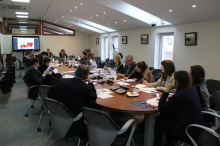On 30 January 2015 at the Federal Chamber of Lawyers of the Russian Federation was held the seminar “Tools for Managing Arbitral Proceedings. Innovations and Advantages of the 2013 HKIAC Administered Arbitration Rules”. Senior Associates of KIAP, Attorneys at Law, Irina Suspitcyna and Mikhail Samoylov attended the event.
It is a well known fact that to be successful arbitral institution shall first of all offer to the parties modern flexible Rules and arbitration-friendly jurisdiction. Hong Kong definitely meets these criteria.
Firstly, as for flexibility of the procedure HKIAC (the Hong Kong International Arbitration Centre, which was a subject of our previous notes) provides some tools that one hardly can find in other arbitration rules: 1) twin track regime for arbitral tribunal’s fees (Fee Schedule or hourly rates upon the parties choice); 2) wide opportunities for handling complex multiparty- or multicontractual disputes (both provisions on consolidation and rejoinder are available); 3) enforceable (!) emergency interim measures.
Secondly, Hong Kong is a very interesting jurisdiction: neutral venue (tier 5 in Judicial Independence Index 2014-2015 according to the World Economic Forum) combines civil law and common law traditions and perfectly suitable for resolving East-West disputes. One more thing decisive for the parties doing business in Asia - HKIAC awards are enforceable in mainland China (in the last 15 years only 2 HKIAC awards refused enforcement, none in the last 5 years) and in 154 NY Convention signatory states. Furthermore, Hong Kong is one of few jurisdictions where confidentiality of arbitration-related court proceedings and enforceability of interim measures (including emergency ones) granted by arbitrators are legislatively secured.
Finally, HKIAC is not only one of the leading regional arbitral institutions, but also truly international forum exploring new markets (including Russian). Each year HKIAC handles about 2 to 3 cases involving Russian parties and rather sufficient caseload is expected because of the sanctions and increased economic activity in Asia. For the Russian parties HKIAC specifically offers Russian version of the 2013 HKIAC Administered Arbitration Rules and a list of Russian speaking arbitrators.
